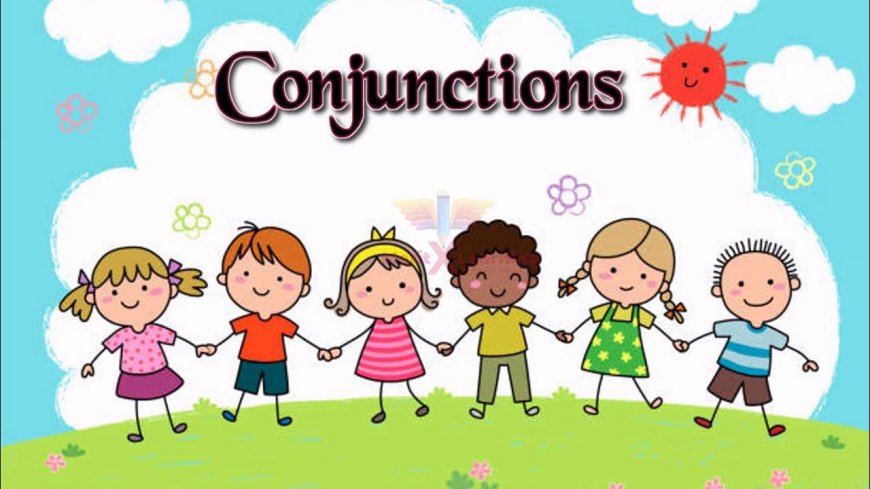Conjunctions- Kinds, Meaning and examples

Conjunction- A conjunction is a part of speech that connects words, phrases, or clauses within a sentence. It is used to show the relationship between different elements of a sentence and to indicate how they are connected. Conjunctions are important for creating coherent and well-structured sentences.
Kinds of Conjunction
There are three types of conjunctions:
- Coordinating conjunctions
- Subordinating conjunctions
- Correlative conjunctions
1. Coordinating Conjunctions: These conjunctions connect words, phrases, or independent clauses of equal importance. The most common coordinating conjunctions are "and," "but," "or," "nor," "for," "so," and "yet." For example:
-
- I like to read books and watch movies.
- She is smart, but he is lazy.
Coordinating conjunctions with meaning and examples
Here are the coordinating conjunctions along with their meanings and examples:
-
And: It connects words, phrases, or clauses that are similar or additive.
- Example: I like to read books and watch movies.
-
But: It connects words, phrases, or clauses that show contrast or contradiction.
- Example: She is smart, but he is lazy.
-
Or: It presents a choice or alternative between words, phrases, or clauses.
- Example: Do you want coffee or tea?
-
Nor: It connects two negative ideas in a sentence.
- Example: He neither called nor sent a text message.
-
For: It explains the reason or cause.
- Example: She went to bed early, for she was tired.
-
So: It shows a result, consequence, or purpose.
- Example: It was raining, so I took an umbrella.
-
Yet: It shows a contrast or contradiction similar to "but."
- Example: She studied hard, yet she failed the test.
2. Subordinating Conjunctions: These conjunctions connect an independent clause with a dependent clause, indicating a subordinate relationship. They introduce dependent clauses that rely on the main clause for meaning. Some common subordinating conjunctions include "because," "although," "while," "since," "if," "when," and "unless." For example:
-
- I will go for a walk if it stops raining.
- She cannot eat ice cream because she is lactose intolerant.
Subordinating conjunctions with meaning and examples
Here are some subordinating conjunctions along with their meanings and examples:
-
Because: It introduces a reason or cause.
- Example: I stayed home because it was raining.
-
Although: It introduces a contrast or concession.
- Example: Although it was cold, she went outside without a jacket.
-
While: It indicates a simultaneous action or time frame.
- Example: He read a book while waiting for the bus.
-
Since: It introduces a reason or time frame.
- Example: She has been absent since last week.
-
If: It introduces a condition or possibility.
- Example: If it rains, we will stay indoors.
-
When: It indicates a specific time or condition.
- Example: I will visit my parents when I have some free time.
-
Unless: It introduces a condition that must be met for something else to happen.
- Example: Unless you study, you won't pass the exam.
-
Before: It indicates a time or event that precedes another.
- Example: Please finish your homework before going out to play.
-
After: It indicates a time or event that follows another.
- Example: She went to bed after finishing her work.
-
Where: It introduces a place or location.
- Example: Let's meet at the café where we had coffee last time.
- Since : To express cause or reason.
- Example: Any contact with him is not possible, since he doesn't live here now.
- As: To express cause or reason.
- Example: She may not climb the stairs as she is old.
- So that: To express purpose or goal.
- Example: He works hard so that he may pass.
- Lest: To express result in the negative.
- He works hard lest he should fail.
- Therefore: To express condition
- Example: He had a fever therefore he did not go to school.
- In case: To express probability.
- Take your umbrella in case it rains.
3. Correlative Conjunctions: These conjunctions come in pairs and work together to connect words, phrases, or clauses. The most common correlative conjunction pairs are "either...or," "neither...nor," "both...and," "not only...but also," and "whether...or." For example:
-
- You can either have cake or ice cream.
- She is not only intelligent but also hardworking.
correlative conjunctions with meaning and examples
Here are some examples of correlative conjunctions along with their meanings:
-
Either...or: It presents a choice between two alternatives.
- Example: You can either come with us or stay at home.
-
Neither...nor: It indicates the negation or exclusion of two alternatives.
- Example: Neither John nor Mary attended the party.
-
Both...and: It indicates the combination or inclusion of two elements.
- Example: She is both intelligent and hardworking.
-
Not only...but also: It emphasizes the inclusion of two elements, often with an added emphasis on the second element.
- Example: He is not only a talented musician but also a skilled painter.
-
Whether...or: It introduces two possibilities or alternatives.
- Example: I don't know whether to choose the blue or the red dress.
- No sooner... than: It is a correlative conjunction pair used to express that one event or action immediately follows another.
- No sooner had I closed the door than the phone started ringing.
What's Your Reaction?






















































